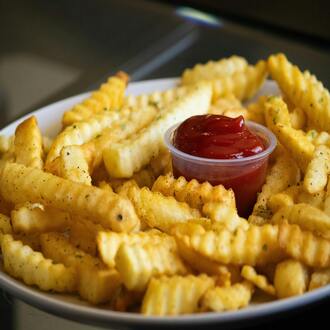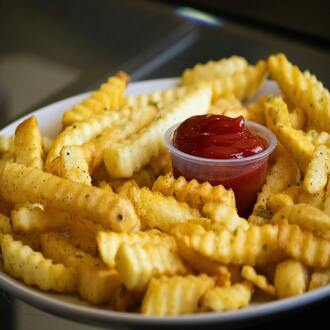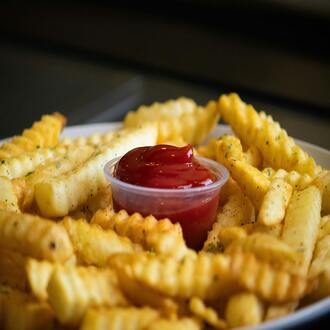Transcription Foods to increase muscle mass
Obviously the athlete must include a large number of foods in his diet so that essential nutrients are not lacking; but some food groups must be present in almost all his meals because they favor the development of muscle mass in a healthy way. In this presentation we will describe the nutritional characteristics of some foods that we should eat when we want to tone up and gain muscle mass.
Cereals
Cereals are a source of complex carbohydrates, vitamins, minerals and dietary fiber that combined with proteins become a perfect combination to increase muscle mass. The most commonly used cereals in human nutrition are wheat, rice, corn, barley, oats and rye.
Most recommended cereals and derivatives
- Bread: It is a source of complex carbohydrates and vegetable proteins with low sugar and fat contents. It is recommended the consumption of grilled toasted bread (biscotti) in the meals before and after the trainings for being more digestible. However, in the rest of the meals, the consumption of whole wheat bread favors digestion and provides a greater number of nutrients.
- Rice and pasta: These are foods that provide energy relatively quickly to the body, ideal to accompany proteins before and after training. When rice or whole wheat pasta is consumed, the energy intake is done gradually, so they are highly recommended for dinners.
In addition, rice is one of the few cereals that does not contain gluten, so it is an essential food in the diet of celiac athletes.
- Whole grain breakfast cereals: They have a high nutritional value because they are made from whole grains and enriched with minerals and amino acids. When eaten with milk, they are a high-energy food with high added nutritional value. They should be included in all athlete's breakfasts and snacks.
Meats
They provide proteins of high biological value that the organism requires for the increase of muscle mass stimulated by the intense practice of physical exercise. They also contain minerals such as iron, phosphorus, potassium and B vitamins.
In previous presentations we learned that the fat content in the athlete's meals (especially before and after training) should be reduced. This condition forces them to choose meats with lower fat content; for example: chicken, rabbit and turkey.
Fish
They are rich in proteins of a biological value slightly lower than meat, and are used in the athlete's diet as substitutes for meat. They provide vitamins (A, E, D and B12) and minerals such as phosphorus, potassium, zinc, iodine, iron and selenium, micronutrients that favor muscle contraction and reduce oxidation due to prolonged intense physical exercise.
Some fish are even more recommended in the diet of athletes because they contain omega-3 polyunsaturated fatty acids, substances that reduce inflammation and facilitate the athlete's recovery after intense training sessions. For example: salmon, sardines, anchovies, tuna, mackerel, etc.
Eggs
Eggs contain all the amino acids that the body needs for the repair and development of muscle tissue; they also contain sodium, potassium, magnesium, phosphorus, selenium, zinc, iron and calcium; they are also better digested than dogs, fish and dairy products, which is why they are highly recommended in the athlete's diet.
To facilitate the digestion of their proteins, eggs should be consumed cooked, preferably whole. They can be included in any of the athlete's meals throughout the day. However, they should not be eaten in excess because the yolk contains high levels of cholesterol.
Milk
Milk is a very complete and necessary food in the athlete's diet for the following reasons:
- It contains carbohydrates suitable for providing or quickly replenishing energy reserves in the muscles.
- It supplies proteins of high biological value necessary for muscle recovery and growth.
- It provides calcium and phosphorus in adequate amounts and proportions for proper bone calcification.
- Contains high concentrations of sodium and potassium, elements that favor fluid retention and post-workout rehydration.
Fruits and vegetables
Due to their content of vitamins, minerals, bioactive substances and water, fruits and vegetables are essential foods in the diet of athletes.
However, the consumption of some fruits should be moderate, as they provide large amounts of simple carbohydrates that can increase blood sugar levels rapidly.
Most recommended fruits
- Banana: It is known as "the best sports fruit" because in addition to providing energy, it is rich in potassium and magnesium, two of the minerals involved in water-electrolyte balance and muscle contraction. Moreover, it is easy to transport and preserve.
- Apples and pears: They can be included in any meal throughout the day because they have a very low glycemic index.
- Citrus fruits: Oranges, tangerines, lemons and kiwis are recommended in the diet of athletes because in addition to being rich in vitamin C and other antioxidant substances, they facilitate the rehydration of the athlete.
Nuts and dried fruits
They are concentrated sources of energy, taking into account that a 25-gram serving of almonds provides 151 kilocalories.
They also provide fiber, protein and good quality fats. They are an excellent source of vitamin E (alpha, beta and gamma-tocopherols), which acts as a potent antioxidant, capable of protecting immune function, inhibiting cellular oxidative damage, and reducing cardiovascular risk.
food muscle mass increase food




